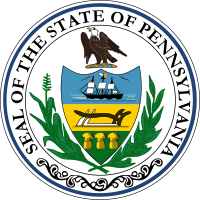Pennsylvania Gaming Control Board
The Pennsylvania Gaming Control Board is a governmental agency of the Commonwealth of Pennsylvania, founded in 2004 as the state licensing and regulatory agency responsible for overseeing slot machines and casino gambling in the state.
 | |
| Agency overview | |
|---|---|
| Formed | 2004 |
| Jurisdiction | Pennsylvania |
| Headquarters | 303 Walnut Street, 2nd Floor, Strawberry Square, Harrisburg, PA 17101 |
| Agency executives |
|
| Website | http://gamingcontrolboard.pa.gov/ |
The first completely new agency created in Pennsylvania in over 30 years, the PGCB administers the Pennsylvania Race Horse Development and Gaming Act, also known as "Act 71", and its regulations to assure public trust and confidence in the credibility and integrity of casinos in Pennsylvania. The Board also acts to fulfill "the objectives of limited gaming in the Commonwealth to deliver a significant source of revenue, assist the horse racing industry, provide broad economic opportunities and enhance tourism."[1]
The PGCB does not oversee games of chance in the Commonwealth such as the Pennsylvania Lottery or other permitted games of chance at clubs and non-profit organizations.
Composition
The board consists of seven voting members, three of which are appointed by the Governor of Pennsylvania and four of which are appointed by the leadership of the Pennsylvania General Assembly.[2] By statute, the State Treasurer, Secretary of Revenue, and Secretary of Agriculture are non-voting ex officio members.[3]
Notable board members
- Jeffrey Coy
- Gregory Fajt (Chairman, 2009–2011)
- Richard G. Jewell
- Keith R. McCall
- William H. Ryan, Jr. (Chairman, 2011–2015)
- Gary Allan Sojka
Duties
Among other duties, the Board operates a slot-machine testing center. Located above the Board's Harrisburg office, the center was established in September 2008. Each month, Pennsylvania casinos and slot-machine operators give the Board a list of the "payouts" on each of their machines: how often and how much they pay per average play. Board employees at the center test various models of slot machine to measure their payouts. This information is not passed on to the public.[4]
The PGCB also set up an Office of Compulsive and Problem Gambling devoted to "understanding and alleviating the devastating effects of pathological gambling."[5] Under PGCB’s regulations, gambling facilities in the state must submit and have approved a compulsive-and-problem-gambling plan before starting gambling operations. These plans must include items such as employee training when dealing with compulsive gamblers, self-exclusion plans and how to handle people who want to be on Pennsylvania’s self-exclusion list, the responsibility of patrons with respect to responsible gambling, the availability of printed material and signage throughout the casino, and procedures to prevent intoxicated and underage gambling.[6]
Funding and support
The PGCB's funding is from several sources, none directly from taxpayers. The largest funding mechanism is from slot machine revenues, but only after deduction of appropriate taxes that are transferred to a number of recipients:[7]
- the local and county governments that host a facility
- the horse racing industry
- economic development and tourism efforts, and
- a State Gaming Fund which primarily provides revenues to school districts which, in turn, utilize toward the lowering of local property taxes.
In addition, the PGCB bills applicants for investigative costs associated with securing any type of license and manufacturers of slot machines and related goods who seek approval of equipment to be utilized in casinos.
The Gaming Act also requires a role in gaming oversight by the State Police, Department of Revenue and Attorney General, whose costs are also reimbursed from slot machine revenues.
See also
References
- "Pennsylvania Gaming Control Board". Pennsylvania Gaming Control Board. Retrieved 2009-01-01.
- Members Archived 2007-04-27 at the Wayback Machine, www.pgcb.state.pa.us
- Ex officio Archived 2007-04-26 at the Wayback Machine members, www.pgcb.state.pa.us
- Thompson, Isaiah (2009-01-07). "Meet Your New Neighbor". Philadelphia CityPaper. Archived from the original on 2009-03-27. Retrieved 2009-03-31.
- "PGCB's Director of Compulsive and Problem Gambling Provides Lawmakers With Update on Agency's Assistance Efforts". PGCB via Reuters. 2009-02-12. Retrieved 2009-04-23.
- http://www.pacode.com/secure/data/058/chapter501a/chap501atoc.html
- "Casino Gaming Benefits for Pennsylvanians". Pennsylvania Gaming Control Board. Retrieved January 16, 2019.